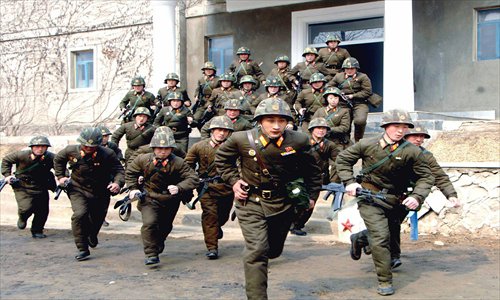UN passes NK resolution

The UN Security Council Thursday unanimously passed a resolution to impose renewed sanctions on North Korea for its nuclear test last month, a move against which Pyongyang vowed in response to adopt more severe countermeasures.
The resolution, reportedly proposed by the US and China, added three new individuals and two entities to the UN sanctions blacklist, and tightened restrictions on the North's financial dealings, including "bulk cash" transfers, linked to its weapons programs, AFP reported.
According to South Korea's Yonhap News Agency, the resolution calls for mandatory inspections of North Korean ships and planes suspected of carrying banned items, including luxury goods.
The UN's powerful body expressed its determination to take further significant measures in the event of another North Korean rocket launch or nuclear test, Yonhap quoted the resolution as saying.
The North shrugged off sanctions imposed after its nuclear tests in 2006 and 2009 to stage a banned, long-range rocket test in December last year and a nuclear test on February 12.
Choi Choon-heum, a senior researcher at the Korean Institute for National Unification, told the Global Times that the tightened resolution shows "a very bold stance and China's enhanced cooperation."
"The sanctions mainly target potential proliferation of the North's nuclear technologies and nuclear materials. It will absolutely pile pressure on Pyongyang," Yu Shaohua, director of the Department for Asia-Pacific Security and Cooperation at the China Institute of International Studies, told the Global Times.
The new resolution does not include Articles 41 and 42 of Chapter 7 of the UN Charter, which allows all UN members to enforce sanctions by military means, though Washington and Seoul had been reportedly seeking to adopt the articles, Yonhap reported.
Ahead of the Security Council's vote, China's foreign ministry spokeswoman Hua Chunying Thursday told reporters that China supports a "necessary and appropriate" reaction by the UN toward the North's nuclear test.
According to North Korea's official Korean Central News Agency, a spokesman for the North's foreign ministry Thursday said before the vote that the adoption of the resolution will compel Pyongyang to "take at an earlier date more powerful second and third countermeasures as it had declared."
The spokesman also warned that if the US dares ignite the fuse of a nuclear war, the country would exercise the right of preemptive nuclear attack for self-defense, and noted that "it has become difficult to avert the second Korean War."
Thursday's harsh rhetoric came two days after the North's supreme military command announced it would scrap the Korean War Armistice Agreement on March 11, in response to a series of US-South Korea military drills, which are scheduled to run until the end of April.
Choi said Pyongyang's statement could mean "North Korea is willing to do much more than what they did with the navy ship Cheonan and Yeonpyeong Island."
"It's possible that North Korea will hold another nuclear test or rocket launch because, unlike the somewhat skillful Kim Jong-il, Kim Jong-un doesn't have enough know-how of world politics, thus creating more uncertainty," said Choi.
Yu said the strong reaction from Pyongyang was in line with the regime's ideology. "The North believes that it has to act stronger against a tough position of the international community, and only by doing so could other parties back down for fears that the situation would spin out of control."
However, Yu said that it is unlikely the North would launch a preemptive nuclear strike, which would be premature given its relatively underdeveloped technology.
The analyst also noted that the sanctions imposed by the UNSC would not effectively undermine Pyongyang's determination to build nuclear weapons.
"While pressuring it, the international community should also leave some leeway for negotiations and create conditions for dialogues," said Yu.
Agencies contributed to this story